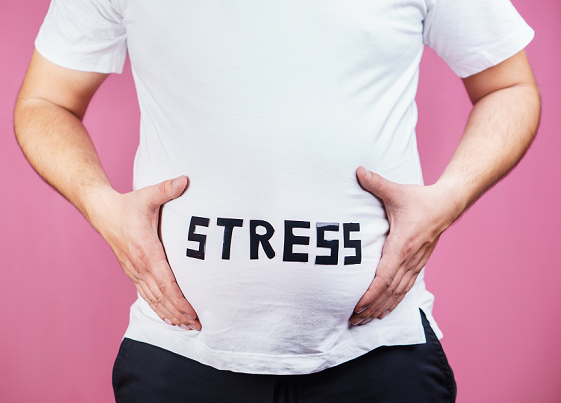There is a very strong correlation between stress and weight gain. Since we all have stress in our lives, how can we ever lose weight then? Understanding the mechanisms of how stress contributes to weight gain help us use some tools to help lessen the adverse effects of stress on our waistline.
Stress is interpreted by the body as a “fight or flight” response. Geared from thousands of years of the need to avoid aggressive animals in nature, when danger approaches, the fight or flight mechanism kicks in. Stress is a lower grade, chronic fight or flight response, that in some ways is worse than the short-term intense shot of cortisol and adrenaline (two hormones released as part of that mechanism).
Several things happen in fight or flight: digestion powers down, way down, because it isn’t needed to fight or flee. Blood sugar raises to provide more energy to fight or for endurance and muscle food when running. Cortisol is released as part of this mechanism. Cortisol tells the body to increase body fat, particularly belly fat. Cortisol increases cravings for sweets and sometimes also salt and fats. During stress, usually because of cortisol, sleep deteriorates. Some of the fat burn occurs during sleep. The less you sleep, the less fat you burn. One study says about 104 calories per night less. Not much, really, until you add it up day and night. On average, that amounts to about 11 pounds weight gain per year.
When stressed, people tend to reach for easy foods – snacks, fast food, easy-to-prepare foods and consumables that just make you feel good, even if it is only temporary. Chronic stress also increases the appetite, so you eat even more junk foods and larger portions at every meal. When stressed, especially when there is much to do, people tend to skip meals, not wanting to take the time. Skipping meals can lead to the body’s interpretation of that as a time of famine, lowering the metabolism in response. Skipping meals is rarely a good idea, especially when stressed.
During times of stress, the diet should be super good. Providing the nutrients necessary helps the body cope with stress better, which means that the emotional aspects are more balanced, and fewer bad habits get developed. Consume foods rich in nutrients like quality meats, vegetables, fruits and small amounts of whole grains. Water in sufficient amounts is essential in increasing metabolism, reducing cravings (many sweet cravings are actually thirst), and helping the brain. When stressed, many forget to take the time to exercise, furthering the widening waistline. While there are many things you can do to help with weight issues, getting stress under control is a great start.
©2019 Holly A. Carling, O.M.D., L.Ac., Ph.D.







